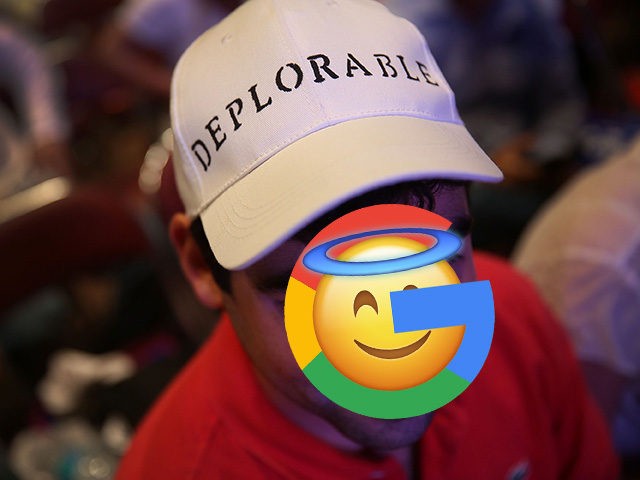A new report claims that Google runs 2 blacklists designed to remove "fringe domains" and op-eds from featured snippets at the top of Google search results.
Controlling information controls what people believe to be true, ultimately, it controls the people.
And Google controls 3.8 million searches per minute.
Is this the latest attempt to control the "deplorables?"
The quick answer is yes.
Be informed.
Breitbart News is reporting that Google runs two blacklists to remove "fringe domains" (also known as "deplorables" in Hillaryland) and op-eds from information or answer blocks at the top of information searches.
It's been discovered that Google has two blacklists that are part of its web answer feature.
The first one is called "webanswers__url__blacklist", which impacts Google's "featured snippets" or answer blocks.
The second blacklist is called all__fringe__domains, and it appears to be generated by an algorithm.
Why this is profoundly important.
Google dominates the flow of information on the internet worldwide.
Last month (May 2019) shows the following global market share on searches for information:
Google--92.04%
Yahoo!--2.67%
Bing--2.39%
Google receives over 63,000 searches per second on any given day. That's the average figure of how many people use Google per day, which translates to at least 2 trillion searches per year, 3.8 million searches per minute, 228 million searches per hour, and 5.6 billion searches per day.
Google is manipulating who gets what when it comes to information---and what information they get.
Google controls the distribution of Internet information worldwide. So what they choose to give you, the order in which it is given and what is tamped down, hidden or simply not available, directly impacts what 63 million people per second are reading as they search for facts---and truth.
How Google manipulates the flow of information.
The Daily Caller has done significant research into this Google matter. They, too, report the two blacklist features.
A Google spokesperson told the Caller:
"Featured snippets are a feature within Search that highlights web sources that are likely to contain what you're looking for. Due to special formatting they receive, we have policies that prevent us from showing a featured snippet for topics like civics or medical information where the content lacks broad consensus."
In other words, if most people do not agree with you or your content, you will not show up in a search on that subject. Or you will be relegated to the fringe and become very difficult to find.
But Google denies that. The spokesperson admits that "Our systems are designed to not show featured snippets that would violate our policies."
However, they deny there is "any impact on how a page ranks in organic search listings."
But the proof's in the pudding.
The second blacklist feature called "all___fringe___domains" appears, The Caller says, "to be generated by an algorithm."
Among the websites listed under the fringe domains section include Breitbart News, American Spectator, Breaking911, the website of pastor Brian Jones, the web site of Bring Your Bible To School Day, Consortium News, St. Phillip the Deacon Lutheran Church, The Franklin Society, Free Thought Project, The Gateway Pundit and The Gorka Briefing.
The Caller says, "Multiple websites critical of conservatives are also listed, including Breitbart Unmasked and Spencer Watch.
Brietbart recently reported that other Google searches had linked President Trump and his daughter Ivanka to the web answers section for the term "hebephilia."
After Breitbart challenged Google, they recently removed the image of a young Ivanka sitting on her father's lap.
However, a search of "hebephilia-images" still includes President Trump and his daughter as of yesterday afternoon.
That is sick.
The bottom line.
The Daily Caller concludes,
"Google CEO Sundar Pichai told Congress in December that the company does not 'manually intervene on any particular search result'. But in fact Google does manually intervene in several types of special search results through their news blacklist. The 'web answers blacklist' is more evidence that they do manually intervene in in particular search results."
According to The Caller, "Pichai also said in a recent interview with Axios that the company wants to 'really prevent borderline content, content which doesn't exactly violate policies'."
As you may know, Google is facing pressure from both the Republican administration and the Democrat-controlled House, with a Department of Justice antitrust probe and a new set of hearings in Congress on competition in digital markets.
The takeaway for Christians
In regards to Google and other Internet information platforms, we must always be discerning. I am usually suspect to much of what I read on the Internet. In writing this column, we do a great deal of research, trying to get it right. The same is true for the content we share on our daily live radio program, however, there is no question in my mind that Google and the lesser lights of information services are biased and they find ways to influence how we think and what we believe.
Be discerning.
We live in a world saturated with media, and technology has infiltrated every area of life. The Internet is having a profound impact on Christianity---both good and bad.
We must constantly evaluate what influence the Internet is having on our personal lives.
And how it can be used to further the gospel.
A rather lengthy article on the pros and cons of the Internet was published in the Christian Post recently. The following is a brief overview.
Benefits.
1. Technology gives millions access to the Truth of the Gospel.
According to the PEW Research Center, 71% of all online adults use Facebook, Twitter, and Instagram, and 58% of the entire adult population use social networks.
2. Technology allows us to experience faith in real time.
Lifeway Research has found that 84% of churches have their own Facebook page, and/or their own web site.
Barna Research has found that the most common way Millennials seek the truth and religion is through the internet.
3. Technology allows Christians to give witness to the world.
PEW has found that in an average week, 20% of all Christians share their personal faith in Christ on social networks. Facts & Trends has found that more than 4 in 10 Millennial's participate in online faith discussions.
The negative.
1. It can negatively impact Christian fellowship.
Social media tends to turn us inward. The Gospel is intended to turn us outward toward a world that needs to hear the Good News.
2. Technology can cause us to lose our identity in Christ.
Facebook and Instagram cause us to consistently put our best foot---or face---forward. This can lead to performances rather than authenticity. We can become a "make believe Christian"---our lives can become an "act" for the next selfie, rather than an authentic expression in the real world.
3. Technology can cause us to lose sight of the message of the Gospel.
Technology---including Google as I mentioned above, seeks "consensus, coherence, and conformity to culture. It undermines norms and even deeply held beliefs. "Could something be wrong when everyone else is doing it?"
Do not allow technology---Google, Facebook, Twitter, Instagram, etc, define who you are in Christ.
Be not conformed to this world. Be transformed by the renewing of your mind. Know Christ. Know His Gospel.
Be Informed. Be Vigilant. Be Prayerful. Be Faithful.


